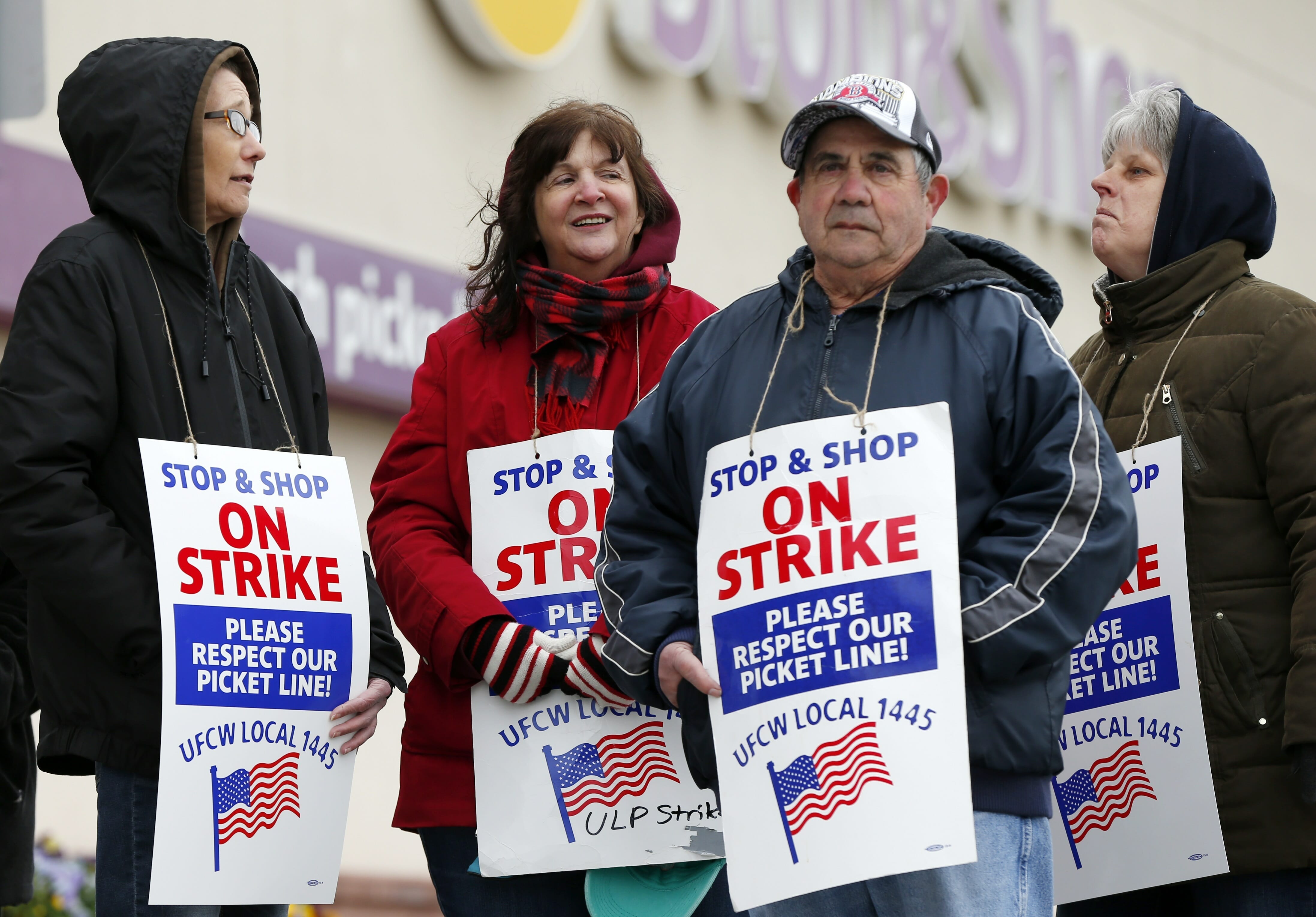
Rabbis: 'Not kosher' to patron grocery store during strike
BOSTON (AP) — As thousands of Stop & Shop workers remain on strike in New England, some Jewish families are preparing for Passover without the region’s largest supermarket chain, which has deep roots in the local Jewish community.
A number of rabbis in Massachusetts, Connecticut and Rhode Island have been advising their congregations not to cross picket lines to buy Jewish holiday essentials at the store that one analyst says has the highest sales of kosher products among New England grocery stores. More than 30,000 Stop & Shop workers walked off the job April 11 over what they say is an unfair contract offer, a claim the company disputes.
“The food that you’re buying is the product of oppressed labor and that’s not kosher,” said Rabbi Barbara Penzner, of Temple Hillel B’nai Torah, a reconstructionist synagogue in Boston. “Especially during Passover, when we’re celebrating freedom from slavery, that’s particularly egregious.”
Rabbi Jon-Jay Tilsen, of Congregation Beth El-Keser Israel, a conservative synagogue in New Haven, Connecticut, cited ancient Jewish law prohibiting artisans from taking the livelihood of fellow artisans.
Tilsen said that ban is akin to the use of replacement workers by companies during labor strikes, which Stop & Shop has employed. “I am not making any judgment about the current strike,” he stressed. “I am stating that we, local Jews, must respect the workers’ action.”
But at Temple Shalom, a reform synagogue in the Boston suburb of Newton, Rabbis Allison Berry and Laura Abrasley said it’s ultimately a personal decision, though one they suggest should be framed within the American Jewish community’s long history of supporting organized labor.
“Jewish law is interpreted in different ways,” they said via email. “We encourage our members to celebrate the upcoming holiday in a manner that honors both the Jewish value of freedom and workers’ dignity.”
Penzner and other rabbis acknowledge their call to avoid the ubiquitous grocer can be challenging for some, especially in more remote communities where Stop & Shop is the most affordable — and sometime the only — place Jews can get matzo meal, for making matzo balls, gefilte fish, coconut macaroons and more for Passover Seder.
New Haven resident Rachel Bashevkin said she stocked up on Passover essentials before the strike. And for anything else, she won’t be turning to Stop & Shop, which she said stocks harder to find items that make the meal extra special, like specialty baked goods, desserts, sweets and teas.
“The message of Passover is to me totally (that) you don’t celebrate your holiday at the expense of other people,” she told the New Haven Register earlier this week.
The dilemma isn’t unique to Jews, either.
Rev. Laura Goodwin, of Holy Spirit Episcopal Church, in Sutton, Massachusetts, said she had ordered the church’s Easter flower arrangements from the nearby Stop & Shop weeks ago. But when it became clear the strike wasn’t going to end before the holiday, she scrambled to purchase enough tulips, hyacinths and daffodils from other stores.
“I just personally wasn’t comfortable crossing the picket line,” Goodwin said. “Flowers are nice, but they’re not as important as people’s livelihood.”
The religious protests could have significant consequences for the bottom line of the Quincy, Massachusetts-based chain, said Burt Flickinger, a grocery industry analyst for the Strategic Research Group, a New York-based retail consulting firm.
Stop & Shop, which operates about 400 stores in New England, New York and New Jersey, is owned by the Dutch supermarket operator Ahold Delhaize but was founded in the 1900s by a Boston Jewish family whose descendants remain major philanthropists and civic leaders in New England.
Flickinger estimates the company has been losing about $2 million a day since the strike started, a financial hit that will only magnify in the coming days. Passover and the Christian holiday of Easter typically represent about 3% of the company’s annual sales.
“They’ll see big inventory loses, especially on profitable products like produce, flowers, meat and seafood that will go unsold,” he said, projecting the losses for the company could be as much as $20 million for the time period.
Flickinger said competitors are already reaping the windfall, as can be seen in packed parking lots and long lines at many of Stop & Shop’s regional rivals, including Shaw’s and Market Basket, in recent days. He estimates competitors could see as much as a 20 percent bump in sales during the holiday season with the market leader largely sidelined.
Stop & Shop declined to comment on Flickinger’s projections but apologized to customers for the inconvenience. The company has kept most of its 240 stores in Massachusetts, Rhode Island and Connecticut open, but bakery, deli and seafood counters have been shuttered. The company’s New York and New Jersey locations aren’t affected by the strikes.
“We are grateful for members of the Jewish community who rely on our stores for kosher and Passover products,” the company said in an emailed statement. “We’re doing everything we can to minimize disruptions ahead of the holiday.”
The Western Journal has not reviewed this Associated Press story prior to publication. Therefore, it may contain editorial bias or may in some other way not meet our normal editorial standards. It is provided to our readers as a service from The Western Journal.
Truth and Accuracy
We are committed to truth and accuracy in all of our journalism. Read our editorial standards.
Advertise with The Western Journal and reach millions of highly engaged readers, while supporting our work. Advertise Today.












